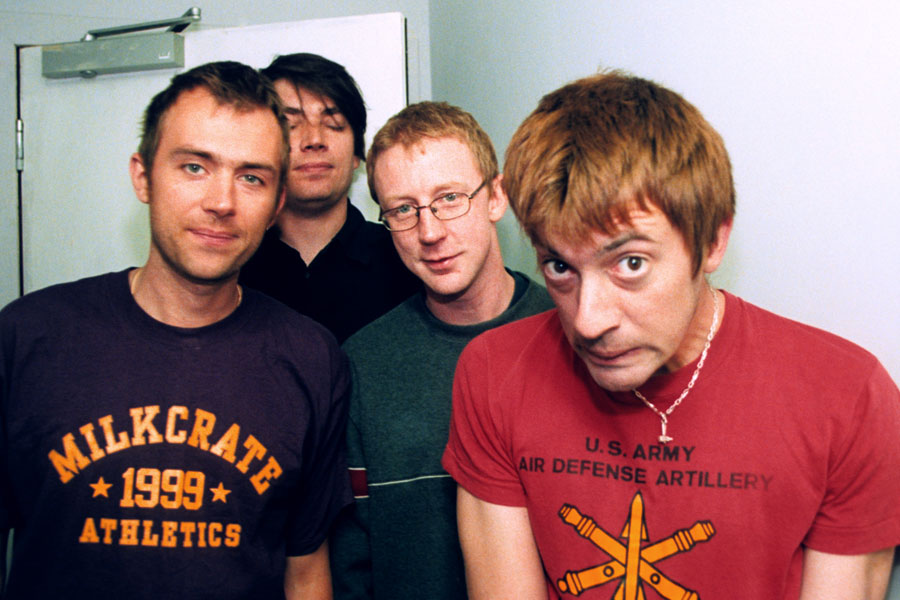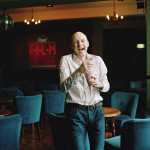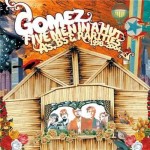I moved to London in 1993. At the time my musical tastes had taken a turn for the worst and I was all over the place. I bought my first CDs and CD player – I remember the miniscule collection well, mainly ordered from one of those rip-off mail order companies that tie you in for aeons. Tricky. Ruby. Massive Attack. Shara Nelson. Yes I had embraced ‘trip-hop’ – whatever that was. Anything new and dancey it seems. Goldie. Underworld. Chemical Brothers. The Orb. Or was it Orbital? Whatever. I fell for it all, hook, line and sinker. But I had my salvation in the shape of Nirvana. Always Nirvana. In Utero was never far away from my ears, a record which sucked you in, screamed in your face, slapped you, beat you black and blue and then finally curled up into a wasted, shivering foetal ball and told you to leave it alone. It was that good. I had tickets for the gig that never happened at Brixton Academy the following year. I was devastated. When Kurt died it left a large musical void in my life. I saw through the other charlatans (no not THE charlatans…keep up). Soundgarden, Pearl Jam. None of them a patch on the Sub Pop scene. Sonic Youth and The Fall and Nick Cave were a constant, still are. And yes, when it burst into my consciousness, I also bought Oasis ‘Definitely Maybe’. An astonishing debut. It stands up even today – hungry, North-western sounds. Always been a sucker for it, from early Beatles to Joy Division.
An awful, creeping element had started to infiltrate the genuine independent scene – INDIE. ‘Indie’ had everything to do with musical conservatism and nothing to do with independent music. T-shirts worn over long-sleeved tops. A jangly guitar or two. One-dimensional root-note bass lines that plodded as the choruses soared into melodic nothingness. Songs of no consequence. Bands with no identity or glamour. Grey, blank, pointless. ‘Indie’ is what gave us Snow Patrol, Coldplay, Keane today. Bland, insipid, the death knell of music, sent to fill the void of primal terror left open like a gaping, festering wound by Cobain, Grohl and Novoselic. But in 1994, Indie soon transformed into something very much of its time.
Britpop.
Even now the name sends shivers through me. Memories of Albarn in a deerstalker hat presenting the whining, meandering, musically inept sounds of the likes of Echobelly and Menswear on BBC2, embracing this facile marketing coup masquerading as a music scene. Oh how he disowns it now. Of course he does. They all do. But like a dog chasing its tail, pausing only to hungrily ravish its balls, Albarn lapped it up, fed it to us, his sub-Kinkian drawl and visions of a ‘lost’ yester-year Britain a last-ditch attempt to rescue Bleeeurgh. Oh how we laughed as they fought with the Gallaghers – stand-offs at the Brits, even on BBC News at 6, Albarn draped on the cover of NME or Select (now what an abomination of a publication THAT was) in a union flag but dodging any accusations of racism usually aimed at the BNP for doing similar. ‘Cos it was ironic. ‘Cos it was English. ‘Ere lav a duck missus cuppa tea cuppa tea cuppa tea? Cor blimey don’t mind if I do. Didn’t you kill my bruvva? Oh no that was me. Blindin’.
Morons. The lot of them. I never fell for Britpop. There was no edge. No passion. That rage so evident in Oasis’ debut was lost on the second album, and whilst it trounced the ‘opposition’ it was the sound of a band earning too much and going backwards, playing to the masses as everyone clung to their coat-tails in the Britpop ‘war’. The Beatles and The Stones appealed to millions, of course, but there was intelligence and beauty and artistry within their music. Oasis just attracted Mondeo drivers, Shaz’s and thugs. The cliché was that they made music for people who don’t like music. I almost believe this to be true, although my nephews won’t thank me for this. They love Oasis above all else, and are neither of the aforementioned. But I understand that every generation searches yearningly for their John, Paul, Mick ‘n’ Keith. Oasis must still be filling that gap, even in their current state of inactivity. But still – they weren’t Nirvana. They weren’t even Herman’s Hermits. Oh and Blur continued to write mildly catchy songs until they finally imploded.
Then came the imposters…the bandwagonesques (now THAT was a good album, but I digress). Gene. Elastica (good for one album, but essentially Wire). Salad. Marion. Powder. Oh Christ. The horror…the horror. But in their wake there came some good. Suede: great, decadent-sounding first album, over-indulgent second, useless forever more from then on. And then, oh glory be, then…. there were the misfits hiding in the corner. Active since 1978. Possibly on the point of giving in. That was until a little album called His ‘n’ Hers… the singles, Lipgloss, Babies, Do You Remember the First Time. A half-blind, gangly Sheffield intellectual who sang about shagging your mother. A cancelled Stone Roses headlining slot at Glastonbury, a glorious step into the limelight. Common People. Pencil Skirt. Live Bed Show. Lyrics to make you swoon, throw up, be revolted, repelled, overjoyed, overcome. They looked great. They sounded great. They were great. Jarvis. Pulp. How we loved their hand-me-down skinny corduroys, their fans, their artwork, their filth. And many years on how we celebrated and sang our hearts out as they were resurrected at Glastonbury again. How we missed them. How they had pissed all over the dying embers of Albarn’s flag with This is Hardcore. If Britpop was good for one thing, and one thing only, it was Pulp.
Did I ever embrace Britpop? Maybe. Sort of. In a way. I think I may have bought What’s the Story. Possibly Parklife. There was the odd good tune and I did catch Blur last year I admit. Good singles band, I now realise. Yes I think I bought those albums. You had to have an opinion I guess. And it was good to live in London and briefly experience that kind of Beatles-Stones rivalry, if only for something diverting to read, but also for other bands and artists to react to, to oppose, to better, to kick against the pricks (see Pulp). But it was, and remains, a footnote. An insignificance. A folly.
It is 1998. I am waiting for my friend Kevin in The Good Mixer in Camden, scene of so many Britpop drinking sessions between the bands and their fans. In a corner sits a bespectacled man in his 30s with a fringe, a red face and a skateboard on the table. Graham Coxon looks up at me as he caresses his beer, and his eyes appear to glisten. Could be the cold from all the skateboarding down the Kentish Town Road. Could be the booze. Might even be the memories of that epic gig at Mile End Stadium before they demolished it – what a metaphor that was for Britpop. On the jukebox is Travis ‘Why Does it Always Rain On Me’. Then the next song – Parklife. All the people. So many people.
Coxon drains the dregs of his pint, picks up his skateboard. And leaves.




